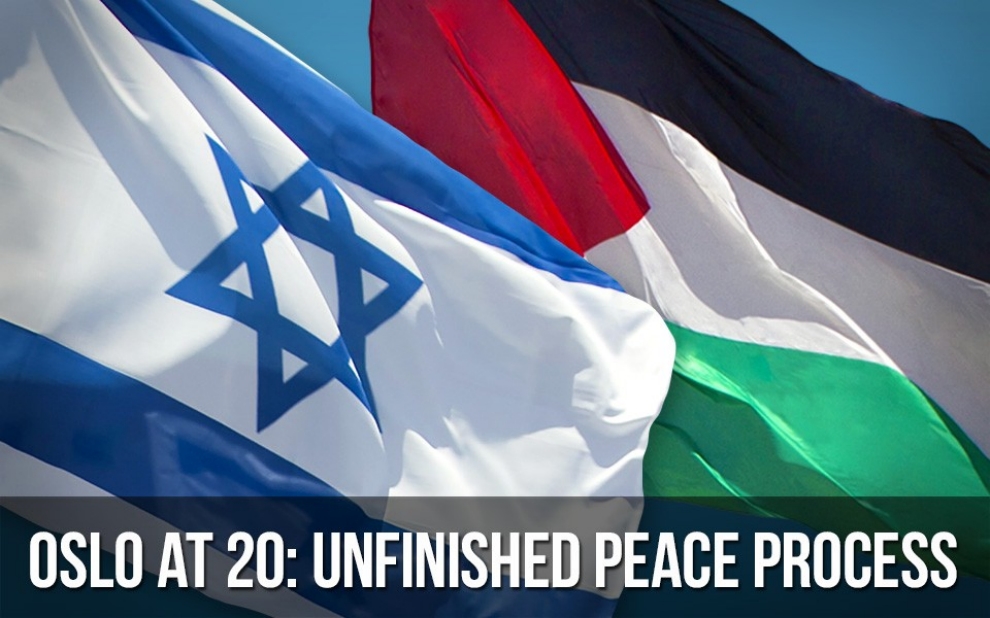-
(중동) 알자지라가 분석한 오슬로 협정 깨진 이유국제문제/중동 2015. 12. 26. 23:25
출처: http://america.aljazeera.com/articles/2013/9/13/oslo-accords-explained.html

Graffiti depicting the military occupation of the Palestinian territories painted on Israel’s controversial separation wall in Bethlehem. Ian Walton/Getty ImagesWhat were the Oslo Accords?
The Oslo Accords marked the first time that the State of Israel and the Palestine Liberation Organization (PLO) formally recognized one another, and publicly committed to negotiate a solution to their decades-long conflict based on territorial compromise.
The accords did not stipulate, but implied, the creation of a Palestinian state alongside Israel. That two-state vision required Israel to abandon its negation of Palestinian claims to national sovereignty, and Palestinians accept that such claims would be limited to only a small part of the entire territory of historic Palestine for which the PLO had been fighting, recognizing Israel’s sovereignty over the remainder.How did the Oslo Accords envisage getting to peace?
The Oslo Accords were not a peace treaty. Instead, they established interim governance arrangements and a framework to facilitate negotiations for a final treaty, which would be concluded by the end of 1998.Oslo transferred control of the major Palestinian cities in the West Bank and Gaza Strip from the Israeli military to a newly-created Palestinian Authority, an interim structure to oversee administration and security in those areas.
The hope was that limited Palestinian self-government and incremental Israeli withdrawal would boost mutual trust that would empower leaders on both sides to negotiate final-status agreements on the thorniest issues -- including Jerusalem, the fate of Palestinian refugees and Israeli settlements, borders and security.
How did the Oslo Accords come about?
The Palestinian mass uprising known as the intifada that began in 1987 failed in its goal of ending Israel's occupation of the West Bank and Gaza Strip, but nonetheless proved to be a game-changer. Images of teenagers throwing stones at tanks won international sympathy for the Palestinian cause and deepened many Israelis' disquiet about the continued occupation. It also prompted PLO Chairman Yasser Arafat to shift his movement's strategy in November 1988, from seeking to reverse the creation of Israel in 1948 with its attendant displacement of the Palestinians, to seeking Palestinian statehood in the West Bank and Gaza Strip.
President George H. W. Bush responded, in partnership with the former Soviet Union, by promoting new peace efforts between Israel, Jordan, Syria, Lebanon and the Palestinians. But the substantive talks between Israeli and PLO officials were conducted in secret in Oslo, Norway's capital, and by August, 1993 the two sides had agreed on a "Declaration of Principles."
On Sept. 9, 1993, Arafat sent Israeli Prime Minister Yitzhak Rabin a letter in which he stated that the PLO renounced armed resistance, vowed to amend the Palestine National Charter to remove its call for the destruction of Israel and pledged to uphold U.N. Security Council Resolution 242, which created a framework allowing for Palestinian statehood in exchange for Israeli security.
Rabin responded by recognizing the PLO as the legitimate representative of the Palestinian people and promising to negotiate peace with its leadership. Four days later, the two leaders met on the White House lawn for a ceremonial signing of the Oslo Accords.
How did Israelis and Palestinians react to the Oslo Accords?
The agreement signed between Arafat and Rabin was controversial for many Israelis and Palestinians.Israelis on the right opposed dealing with the PLO, a group it considered a terrorist organization. Israeli settlers feared that Rabin's land-for-peace formula would result in their eviction from land they regarded as theirs by Biblical right, even if the United Nations had ruled their settlements were a violation of international law.
Among Palestinians, supporters of Arafat's Fatah movement accepted Oslo as an unfortunate, but necessary, compromise. But rival groups such as Hamas, Islamic Jihad and the Popular Front for the Liberation of Palestine refused to recognize Israel, and warned that a two-state solution would betray the aspirations of Palestinian refugees to return to land inside Israel lost during the "Nakba" of 1948.There were skeptics on both sides when the Oslo Accords were signed, and their number only grew as the process failed to deliver on its promise.
How did the Oslo Accords break down?
There was no single moment when the Oslo Accords can be said to have broken down. Instead, they saw a steady process of decline as both sides accused one another of failing to implement key aspects of the agreements.A 1994 massacre by an Israeli settler in Hebron fueled Palestinian anger, and then, in 1995, a right-wing Israeli gunman assassinated Rabin at a peace rally. The following year, after a series of Hamas bomb attacks on civilian targets had fueled outrage in Israel, Rabin's successor Shimon Peres was beaten at the polls by Likud leader Benjamin Netanyahu, who had led opposition to Oslo.
Netanyahu was ousted in 1999 by Ehud Barak, but by then mutual distrust and hostility ran deep, and President Bill Clinton's effort to broker a final-status agreement at Camp David in 2000 ended in failure. The peace process was now eclipsed by an increasingly violent second intifada that inflicted heavy casualties on both sides, and which shifted the international diplomatic tide against the Palestinians. The following year, Israel elected another Likud leader, Ariel Sharon, who vowed to end the Oslo Accords.
Although Sharon withdrew unilaterally from Gaza in 2005, he avoided a return to final-status negotiations. Sporadic attempts to restart talks over the past decade have produced no further progress towards a final-status agreement. Instead, the Oslo Accords' interim arrangements have become a new status quo.Factors often cited for the failure to conclude the Oslo process include:
- Imbalance of power between the two sides
- Failure of the United States to serve as a tough but impartial mediator
- Growing influence of opponents of compromise -- settlers on the Israeli side, Hamas on the Palestinian side
- The gulf between the maximum Israel has been willing to offer and the minimum that Palestinians are willing to accept
'국제문제 > 중동' 카테고리의 다른 글
(중동/이란) 미국의 이란 제재조치 해제후 이란과 중국 유대 강화 (0) 2016.01.24 (중동) Operation Cast Lead five years on: 'We are still demanding justice' (0) 2015.12.26 (중동) 이스라엘과 PLO가 맺은 두 차례 오슬로 협약 (Oslo Accords) (영문자료) (0) 2015.12.26 (중동) 터키군 러시아 전투기 격침시키다 (0) 2015.11.24 (중동) 서방세계는 중동의 민주주의를 원하는가? (0) 2015.11.21
